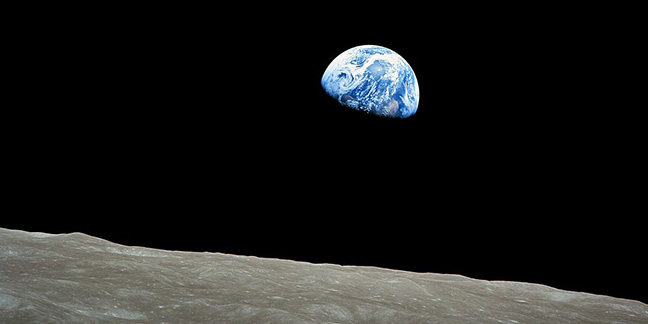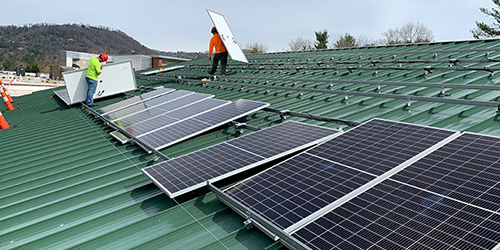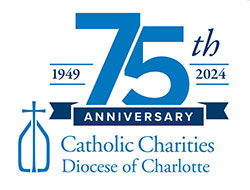 “Earthrise,” taken on December 24, 1968, by Apollo 8 astronaut William Anders was the first photograph taken by humans of Earth. (Public Domain)Editor's Note: Catholic Charities Diocese of Charlotte is highlighting the seven themes of Catholic Social Teaching in conjunction with its year-long 75th anniversary celebration. In this first of a series, “Care for God’s Creation” focuses on having respect for our Creator and the world He entrusted to our care.
“Earthrise,” taken on December 24, 1968, by Apollo 8 astronaut William Anders was the first photograph taken by humans of Earth. (Public Domain)Editor's Note: Catholic Charities Diocese of Charlotte is highlighting the seven themes of Catholic Social Teaching in conjunction with its year-long 75th anniversary celebration. In this first of a series, “Care for God’s Creation” focuses on having respect for our Creator and the world He entrusted to our care.
CHARLOTTE — “Earthrise,” an iconic photo of the planet taken by astronaut William Anders on Christmas Eve in 1968, gave people a new view of our common home – inspiring environmental efforts that continue to this day, including the work of Catholic Charities.
In that image, humanity saw the wonder and fragility of their home where all life must coexist in the universe that God created. That appreciation for God’s creation – and our place within it – is an important theme of Catholic Social Teaching.
“We show our respect for the Creator by our stewardship of creation. Care for the earth is not just an Earth Day slogan, it is a requirement of our faith,” the U.S. bishops have said. “We are called to protect people and the planet, living our faith in relationship with all of God’s creation. This environmental challenge has fundamental moral and ethical dimensions that cannot be ignored.”
May 24 marks the ninth anniversary of Pope Francis’ encyclical “Laudato Si’” or “Praise Be to You,” an appeal to “every person living on this planet” for an inclusive conversation about how we are shaping the future of our world. He calls on the Church and the world to acknowledge the urgency of our environmental challenges and to embark on a new path of awareness and action.
In the letter, and in subsequent writings and speeches, the pope makes an urgent appeal to respond to the climate crisis.
Catholic Charities Diocese of Charlotte has risen to the pope’s challenge, offering parishes and schools resources on how they can start or broaden environmental efforts right here in western North Carolina.
Joe Purello, who leads Catholic Charities’ Social Concerns and Advocacy office, said, “Laudato Si’ challenges us to work to address the environmental crises now facing our planet, and calls us to see beyond the present crises to envision and work for a future in which all humanity is treated with dignity and respect, flourishing in a sustainable common home.”
Environmental awareness and action is a core aspect of Catholic Charities’ mission to provide help to those in need, hope to those in despair, and inspiration for others to follow, Purello said.
“Laudato Si’ also raises our awareness that environmental degradation negatively impacts, in a disproportionate way, those who are poor, those who suffer from chronic illnesses, and those who are younger and older. Our duty to care for creation therefore overlaps with our duty to care for those who are marginalized and vulnerable,” he said.
A few of Catholic Charities educational efforts and resources include: creation care initiatives, Catholic resources on the environment, joining or starting a care for creation team, webinars and parish missions, tips for sustainable shopping and much more.
Renewable energy
 In 2022, Asheville Catholic School became the latest location in the Diocese of Charlotte to install solar panels. (File | Catholic News Herald) With support and information from Catholic Charities, churches and schools across the diocese have blazed a path of environmental stewardship over the past decade. One major effort has been the installation of solar panel arrays to produce renewable, clean energy.
In 2022, Asheville Catholic School became the latest location in the Diocese of Charlotte to install solar panels. (File | Catholic News Herald) With support and information from Catholic Charities, churches and schools across the diocese have blazed a path of environmental stewardship over the past decade. One major effort has been the installation of solar panel arrays to produce renewable, clean energy.
St. Stephen Mission in Elkin was the first to install solar panels on the roof of its fellowship hall in 2010.
In 2015, St. Eugene Church in Asheville installed an array of 147 solar panels on its roof that generates on average $6,000 per year in savings. This covers about 30 percent of the church’s annual energy usage. Since installation, the panels have kept over 600,000 pounds of CO2 out of the air we breathe.
In the spring of 2020, St. Gabriel Church in Charlotte installed an array of 622 solar panels on the roof of its Parish Center and School. The panels produce approximately 345,000 kilowatt-hours per year – about 40 percent of the parish center/elementary school’s annual energy consumption.
In the fall of 2020, a 100-kilowatt solar array was installed on the roof of the Diocesan Pastoral Center. The uptown Charlotte building installed 272 panels to save a significant amount on energy costs – approximately 20 percent.
It is estimated that 26,000 pounds of carbon emissions are not emitted into the atmosphere each month because of the energy saved through these solar panels.
In 2022, Asheville Catholic School was the latest location in the diocese to go solar – installing an array on the rooftop of its new, eco-friendly, 12,000-square-foot addition. The 152 solar panels power about 30 percent of the school’s electricity.
Planting Seeds of Hope
Catholic Charities has also established sustainable vegetable gardens at its Asheville and Winston-Salem locations to augment its food pantry offerings to families in need.
Paired with the Catholic Charities food pantry, the garden at Catholic Charities’ Winston-Salem location aids in feeding 60 to 80 families each week with freshly grown vegetables.
The 1,440-square-foot garden was established in 2018 and features 10 beds that grow foods such as lettuce, spinach, kale, tomatoes, peppers, peas, beets, onions, carrots, eggplant, watermelon, beans and okra.
“People go crazy over the tomatoes and peppers, especially,” said Maureen Irwin, a volunteer who oversees the garden. “I love being outside and taking advantage of everything that nature has to offer. I also love providing fresh, good food for people whose options are limited.”
In 2022 and 2023, the garden produced over 600 pounds of food.
Irwin has the aid of about 10 volunteers who help plant, water, harvest and provide for other needs such as an irrigation system developed by volunteer Carl Westcott. The system doesn’t go directly to the garden, however. Instead, they installed a tank that’s fed by rainwater and condensation from the air conditioner. Its motor and pump get the water where it needs to go.
“Now, we mostly use God’s water as opposed to city water, and that was a huge help,” Irwin says.
The garden also offers educational opportunities for local students. Middle schoolers have visited to learn about topics such as crop rotation and soil testing. The garden is also registered with the state extension service.
In 2020, the Catholic Charities office in Asheville started a similar garden when the pandemic interrupted regular work. Because he couldn’t meet with clients at the time, Scott Meltsner – the office’s bilingual clinical mental health counselor – decided to start a garden to help staff members, clients and program participants handle the stress of a difficult year.
“I was bringing in some of the produce from my home garden, so I thought, ‘Wow, wouldn’t that be a great thing for us to have here?’” he recalled. “Somewhere we can just grow the food at the office and give it away while getting our clients involved in some way.”
Now the 150-square-foot garden is in its fourth season. Nearby businesses have been very supportive, offering volunteers to help with the gardening.
Jesse Boeckermann, regional director of the Asheville location, added, “We’d love to expand this project to grow more food and help more people in need.”
— Catholic News Herald
More online
At www.ccdoc.org/careofcreation: Explore resources and ideas about how you and your parish or school can get involved in caring for our common home. Questions on Catholic Charities Diocese of Charlotte’s environmental efforts? Contact Joe Purello at This email address is being protected from spambots. You need JavaScript enabled to view it. or 704-370-3225.



